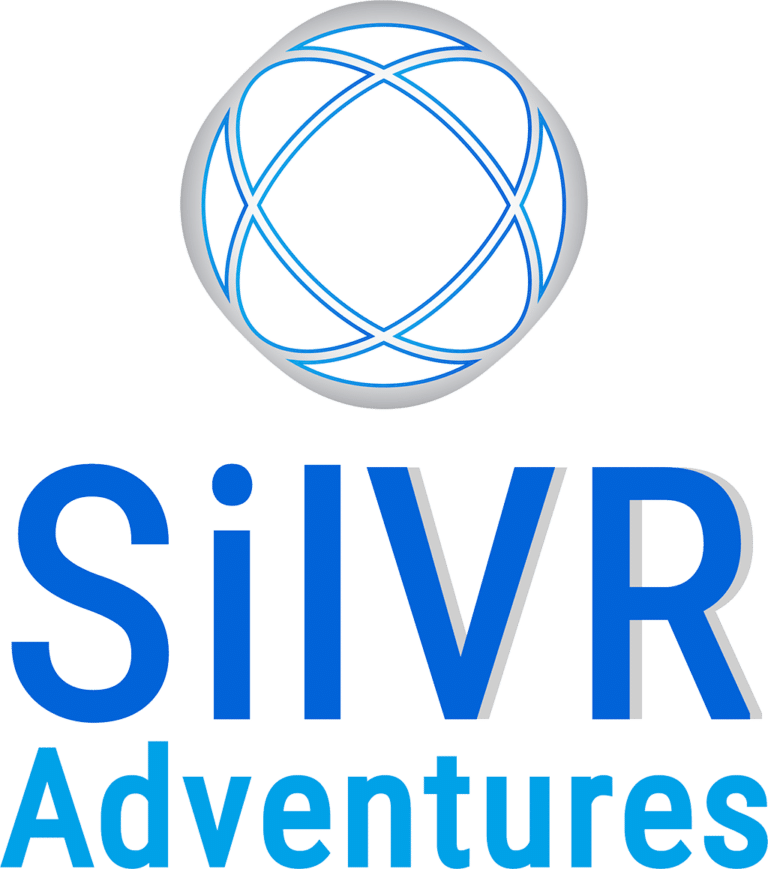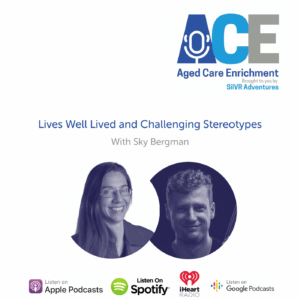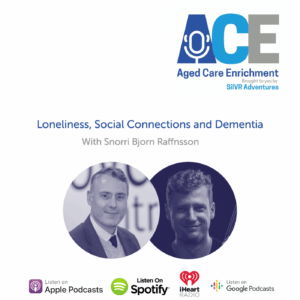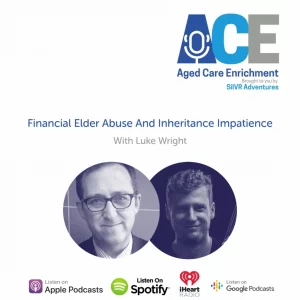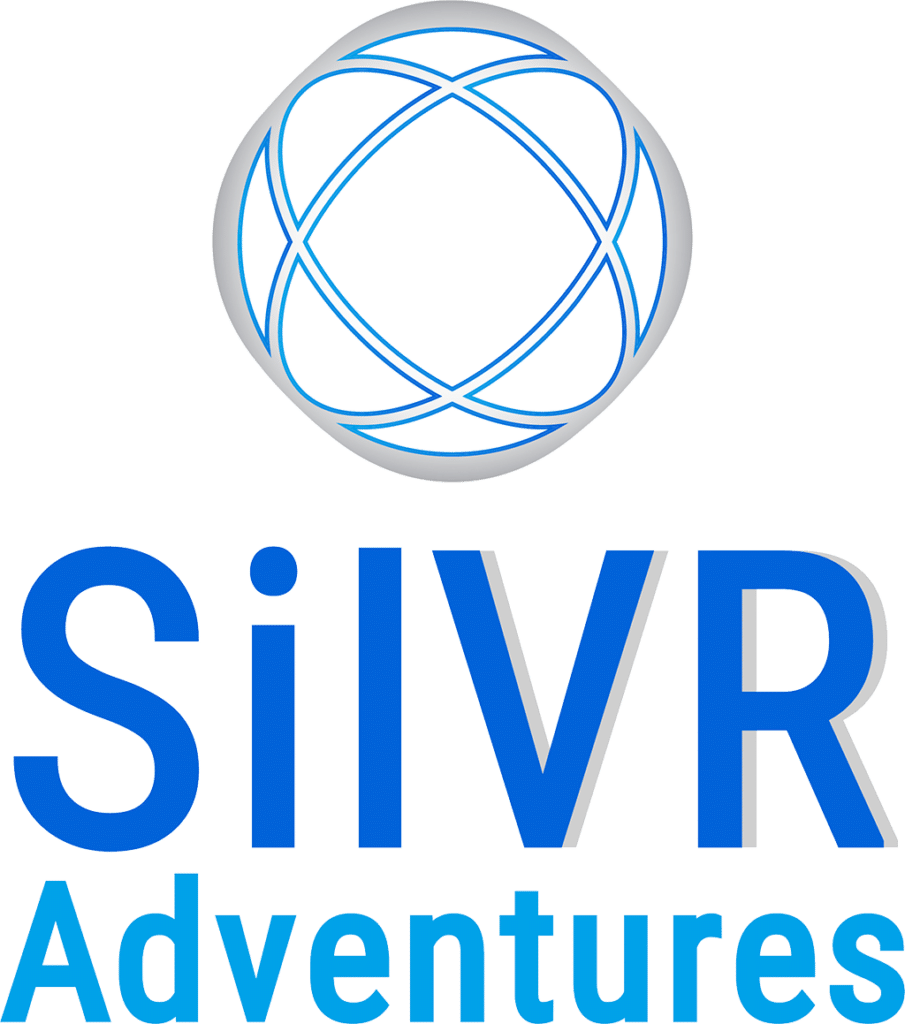Transcript
Ash de Neef: Jannette, thank you so much for joining us in the program today.
Jannette Spiering: Hi Ash!
Ash de Neef: Nice to have you here with us. And calling in all the way from Holland. We were just talking about the connection might be a bit dodgy, Iit’s like those two cans with the piece of string going between, it might be a little bit long going across the world, right?
Jannette Spiering: yes. Let’s see how it will work.
Ash de Neef: I’m sure some of our listeners will be aware of you and your work, but for those who aren’t, could you maybe take us back and explain who you are and what you do?
Jannette Spiering: I have actually been working all my career on how to make environment, organisations whatever comes to life, better for people living with dementia. And actually the biggest change began in 1993 already when I sat down with the management team I was member of right then, and we asked ourselves that very crucial question, which was the start of everything.
“How do you think you would like to live once you become affected by dementia?” Well it seems a very simple question and the answer isn’t that difficult as well because we said we just want to go on with our lives. So from then I started working on the concept of normal life for people living with dementia, and I’ve been doing that till today.
I, and maybe we will come to that during our conversation, but I was able to commission the build of de Hogeweyk, a community for people living with severe demand. I became CEO of all nursing home care of the care group that de Hogeweyk belongs to. And as of two years I’m an advisor on the concept of normal life for people with dementia. And I can use all the experience and the ups and downs, the pitfalls, but also to successes [to say] what change in this area means.
Ash de Neef: What is de Hogeweyk?
Jannette Spiering: De Hogeweyk is actually kind of neighbourhood, a community. We have 27 houses and in every house, six to seven residents live together, so in total we have about 170 residents. Then they live in a normal house, well a dutch normal house, and everyone has his own private bedroom. We have of course bathrooms, there is a big living room with a fully equipped kitchen. There is place where you can do the laundry, so It’s a self-containing household.
And de Hogeweyk is built, because we designed it 20 years ago and that were the regulations then. It’s built as if the walls of all the houses and the amenities, they form a safe environment. So there is one entrance you can come in and you go out, and that is looked after by the receptionists. And that is because due to Dutch law during that time we had to keep people inside. People living with dementia, were not allowed to go outside on their own.
So we thought let’s create a community with lots of freedom. So we have 50,000 square meters and half of it was built upon – and the rest is gardens street, we have a lovely theater square with a big fountain. You can wander around wherever you want, whenever you want. Not being accompanied by a carer. You can just go on your own, because that was one of the big things that we thought about during the design. Freedom to go wherever you want, whenever you go.
And get freedom also gives you the opportunity to socialise. Because if you walk outside and you walk through a neighbourhood and you pass by the restaurant that we have, where you can have lunch or dinner or whatever you want as a resident if you dine out. Most of the time, people eat in their own houses, but you can also dine out in the restaurant with your family, or with people you live in that house.
When you pass that restaurant, people will recognize you, you can have a coffee or a glass of wine. You walk by some of the club rooms. We have a club room for the more craft-like clubs that we have, or we have to Mozart room for the classical music club, or the reading club, or the theater where we have our concerts.
So if you walk around in that neighbourhood with all these amenities, or if you have to do the groceries you go to our supermarket. You have normal things to do and you will meet people outside. And we see a lot of moments that people connect with one another – those are very valuable moments.
That interaction between people? That is what we create for ourselves as we are healthy also the most. And that is still part of your life even if you become affected by dementia and you have to move into, in our case, de Hogeweyk, where only people with severe dementia in the last stages of their lives, almost for two years live. And everyone who lives in de Hogeweyk will pass away in de Hogeweyk.
So that’s all the things you can do there. That creates a kind of a normal environment, and we will be there to support you during the day.
Ash de Neef: It’s so amazing to hear that and think about the institutionalised model. And you started by saying you that you can come and go as you please, and you can wander and go for a walk and see friends. And I was thinking about if you start getting up and going for a walk in some institutions, then you’re labeled wandering. And that’s a symptom that needs to be addressed and perhaps be medicated for wandering.
Jannette Spiering: Yes. And they might be anxious that you might fall and that you will break your hip and which is of course a series accident. But we talked to lots about that in relation to freedom, but what we say is “well, those are calculated risks”. We know that giving freedom or having freedom also can be risky.
Last year I broke my ankle because I put my foot in the wrong spots in the tarmac. And it’s going to happen to me and it can happen to everyone. And it’s part of your life. And that part of your life stays with you also if you have to move to an environment because you can’t cope at home anymore.
And of course we have to look very carefully in how we can mitigate these risks as much as possible of course. But they always will stay risks, and that’s part of life. But there are no more instances in de Hogeweyk with people falling and breaking a hip or something else than in other nursing homes. So it’s not the environment, it’s part of life. Sometimes of course it’s also part of, of getting old, and people tend to trip.
But the counterpart of given freedom in relation to risk is that if you exercise your muscles every day, if you are able to walk around. If that makes you more hungry because you are outside. And if you are sitting down for lunch, you’re really hungry, because you have been outside all day.
You will eat better. You will be in a better condition. So a freedom also gives you the opportunity to age more healthily. So that’s why we say it’s contaminated risk.
Ash de Neef: Fantastic. That’s a really great summary. Thank you. And going back to 1993 and maybe 1991, 1992, the immediate period preceding that conversation, you said that kind of changed the direction of the care that you apart part of. What was it that was the catalyst for that change, why the desire to change at that point?
Jannette Spiering: There was a great dissatisfaction among residents, we then called them patients, about everything. About daily life, about food, about their garments not coming back from the laundry, visiting hours, having no privacy. Their life really was not that good.
So they really complained about that, the family complained. We were getting some competition because another nursing home was being opened some kilometers from us, and we were worried that our staff would go to. And we did not have a waiting list, so we weren’t that popular, and we ourselves were not satisfied.
So putting that all together was the reason why we sat down and thought, “Whoa. We think we have to do something because otherwise no one will be happy, and may be no longer have a chance to exist.”
So, that actually was the reason why. And if we looked at our top 10 complaints people who are not so much complaining about the doctors and the care they were receiving, but it was about living their lives.
And imagine yourself if you have to live in a nursing home. I hope that when you become that old that they will have found a cure. But as long as there’s no cure, we have to make a life for people living with dementia much more agreeable than in some places we’re doing it right now.
Ash de Neef: Yeah, absolutely. That’s fantastic. I think it’s quite interesting that there would be many numerous other organisations around the world that have encountered the same problems that you and the team encountered, but came up with very different solutions. And perhaps ones that weren’t as well received or supportive, or even brave as the ones that, that you took it at de Hogeweyk.
Jannette Spiering: We were a very traditional nursing home, just like all the nursing homes in the mountains, and we were based upon a medical model. And that meant that we thought we could treat people with severe dementia in making them better or lessening the effects of dementia. But we did that only from a medical point of view and not from a holistic point of view as we are seeing right now.
When we thought that having the possibility to live your life like you want to do, but with professional support. Because when you become affected by dementia, you can’t structure your days that well, you need help in certain ways. So if we can go on with our lives with professional support, in an agreeable environment. Supported by people who understand what dementia means, and who are willing to observe what’s going on. And not asking from the person living with dementia to adjust to the organisation, but to adjust your organisation to them. Well that might be a good idea.
So we started transforming that old building we still had in 1993 and changing the environment on the inside. So we re-decorated the whole place, we made smaller groups. We had wards then of 30 people, and we managed to get them to 10 – 10 to 12, which in my view now is still very large, but that was a start.
And we started doing that in a pilot because it was rather daring and we had to change all the organisation, so doing it in one big bang was not that handy. So we started with the pilot and we tried to give that one year to experiment and to see what might become the outcome. But within a year, the whole organisation was changed because the outcome of what we saw happening was so positive. Not only but also for care workers, well for everyone who was at fault for volunteers and for family.
Because what happened was that when creating a normal environment, and giving people attention, and trying to mould the day around their moves and not having too many procedures and too many regulations – well bringing back normal life. It changed behavior of people.
But, still of course we had challenging behavior, but challenging behavior really became less. The rate of medication and anti-psychotics dropped dramatically, because we had these smaller groups there was not so much traffic inside and these living rooms, so people were not that restless anymore.
So a lot changed, a lot changed. And staff was not allowed to wear uniforms anymore. So actually we de-institutionalised the whole place and we transformed it in order to normalise. That’s actually what we did and it sounds very easy, but we found out that doing normal in healthcare is quite difficult. Because of all the regulations, the procedures and protocols and well, whatever.
But we also found out if you really want to do this, well then it can be done. It’s not easy but in the end you will get something.
And what we always say, please do not copy de Hogeweyk because if you live your life, you have to live it within your own norms, your own values. The environment and every country’s different, so don’t copy the architecture. But look at our norms and values and try to implement that in your own environment. And and then you will get your own outcome.
And we’ve seen that it can be done in different countries. Well with you in Australia we were there with Natasha Chadwick when she started her micro town. We’ve met a lot of people all around the world who took something with them and we are always happy if it’s just inspiration that they take away. And the idea that you can change.
Because we think we ought to change quality of life for people living with dementia and it can be done. And in that way we are part of a bigger movement around the world, just as Paola Barberino said some weeks ago from Alzheimer’s Disease International. The awareness, the movement, the change all around the world, that something different has to be done in this area.
Well, I think we have we’re in our own way. We are a part of that too.
Ash de Neef: Yeah, absolutely. And nice to mention Paola there, she was on the show a few weeks ago for us. You were mentioning there for example, that the staff aren’t wearing a uniform and that that would change the feel for the people who are living there. It would also change the feel for the staff as well right?
It would probably make it less of a clear cut and work in a clinical environment and much more of a person to person relationship. How did that affect the staff feel? How did they embrace that?
Jannette Spiering: Well, It was also an experiment for them of course in the beginning. And we as management, we made perfectly clear what we thought that the goal should be. So we had that vision about normalization and we communicated that as best as we could with them.
And we also said to them well, you have to do of course, somethings during the day. You’ll have to provide breakfast, lunch, dinner, you will have to deal medication. You have to do the administration, but for the rest go and see what makes residents happy and what makes you happy.
And in the beginning to let go of the old task approached way of work, that was also difficult for them. Because they were within that routine at having the beds made at 10, sit down for coffee in a separate nursing station, then doing something, whatever. And now we asked them to get rid of that old routine. We kind of deleted the nursing stations because that’s where nurses hide, and they have to be with residents and that’s apart from residents. So for them it was a lot of change too.
But very soon they became aware that having that freedom, because that’s all about freedom for your staff. And being able to let their professionalism work as they liked during the day, that was really satisfying for them.
And they also saw of course the outcome. Their contact with residents became much better, contact the family became much better. Family was not complaining all the time but became partners in, how can we do this? “How can we tell you more about our dad or mum, who she is or who he is, so you can really adjust better to them in the way you take care of them?”
So there was a lot more of conversation, discussion, positive criticism. So it was a kind of, complete turn over, a very vibrant period.
And so that was for the workers, and for management, it had all to do with trust. With giving them trust in doing what they were good at, and that’s taking care of people and connecting with people, and making their day well lived.
So it was quite an experiment and it came out really well for everyone.
Ash de Neef: Yeah, it sounds like a very empowering way to treat the staff to say, “we believe, you know what the right thing to do is here, go out and make people’s lives better”. And not having to micromanage every minute and where they need to be and organize everything out for them.
Jannette Spiering: No, because you can’t do it as management. Well, you can set the framework within, you ask them to do their job. Because it’s not “well, let’s just do whatever we want”. It’s within a very strict framework, a strict vision. But within that you have a complete freedom.
And as management, you have to realise that it’s the caregivers or everyone in your organisation. Not just the carers, but also the gardener and the people working, well in our case, in the restaurants, or at the reception desk. Every moment that they have contact with someone who lives in the neighbourhood, you can make some, some quality moments. You can’t manage that. It’s them we’ll have to do that.
And so you’ll have to let go of all the procedures and regulations and trust and professionalism. And of course you have to – if people do not know how to work within an environment like that, but they are willing, we can teach you. We can educate you.
But if you are not really into this kind of work and are more at the task approach person that’s also fine, but then you have to find some other place to work. Because that complete task approach has disappeared. And it’s freedom, which also brings to responsibility.
Because as a team, you have to manage that household that we have, you have to manage the fact that you have a good menu. You have to manage the budget. You’ll have to communicate that all laundry will be done during the day, that everyone is on time to go to the clubs they are a member of.
Because in our neighbourhood we have a normal life. So it’s kind of managing a household and you must like to do that.
But luckily a lot of carers really love to do that.
Ash de Neef: Moving forward to the present and I know that you’re doing a lot of consulting at the moment through your company, Be advice. And last time we spoke, you were consulting with an organisation in Heathcote in Victoria to set up their own community. What does it look like when you’re going to help another community embrace some of the concepts you guys were using?
Jannette Spiering: What we try to do as I said earlier, is to try to make people aware of what can be done in relation to life for people living with dementia, How normalcy can be applied in environments, but also how you can change a complete organisation. How to deal with that culture change that is needed.
So when people come and talk with us, it’s actually that we try to inspire them by what we have done. Because everyone can understand what we’ve done, so that’s rather easy to do, to comprehend. And then how to operationalise that normalcy, that that’s actually what we talk about with people.
And um, we’ve done that. many people from all over the world. And every time there is a different outcome. Because it’s not our vision that is most important, but it’s your own vision, because you really have to believe in the change you are going to make because dedication we’ll make it work for you. And it takes some guts and some energy and some endurance to get where you want to go.
So creating your own vision with our support, and we created a lovely instrument to structure all those thoughts and all the things you’ll have to go through to the change – our Be Advice paradigm. So we advise people, we support people. We are a sounding board. We don’t implement because that’s not for us, that’s for the management. And the inspiration can vary from whole communities, like you just mentioned – lots of care operators.
I had a minister of pensions from the UK last week on visit, big real estate investors architects. Well, everyone who is interested in doing something in the area of changing life for quality of life, for people living with dementia.
Ash de Neef: Oh, fantastic. So do you think these sorts of ways of embracing change, that’s the future of dementia care?
Jannette Spiering: Well we have a model our Be Advice paradigm, we call it – our care concept. We know of the Eden alternative, we know of butterfly, greenhouse models. They are all great models in relation to change for life for people living with dementia.
We know that in the upcoming years there will be a lot of people who will become affected by dementia, and due to the greying population which will grow older.
So I would never build a Hogeweyk again, that’s may sound strange, but that was 20 years ago. And what we know now is, and what I think we really have to look at is that, people living with dementia have a right to stay included in society. And so the emancipation of dementia, the inclusiveness of people living with dementia is I think what we should strive for the next years.
And of course there will always stay a need for more safe environments like the Hogweyk is, but that can also be in a normal neighbourhood or in a normal society, and not segregated from it. So that, that real integration is our next challenge. And that’s a big challenge because the stigma Paola also talked about it, that stigma around dementia is immense.
And I think that it’s mostly because people do not know what dementia is and they fear confronting people or meeting people with dementia. But that stigma is something we have to work on, because at this moment, society is not yet ready for people living with dementia.
And so that is what I think is the biggest challenge that we are facing for the upcoming years. And it’s not just the carers who have to take care for people living with dementia, but it’s all of us that. That formal network as we called it, all these professionals, but also the informal network of volunteers, family, the neighbourhood, the community. We all have to embrace everyone in our society, so also people living with dementia. And that’s the next challenge I think we are facing.
And what we do now in de Hogeweyk, we call a reverse integration. So we bring people and children into de Hogeweyk to mingle with the people who live in de Hogeweyk. But actually it should be the other way around. People living in de Hogeweyk should mingle or should stay part of normal society.
And we also must be aware that, I think we are facing a bigger challenge than the COVID pandemic. Because what will also be a big problem will be the workforce. Nowadays, we don’t have enough carers or work staff, and then in the upcoming years, it will only become less in relation to the amount of people who will become affected by dementia.
So we do not have a choice as a society, we have to do with together.
Ash de Neef: Yeah. Do you think that these sorts of models are more intensive on the staff that, there are more hours or there is a certain extra requirement placed upon the staff.?
Jannette Spiering: Well, we are aware that in the Netherlands, we have a quite different schooling system and vocational training for people who live with dementia. So people are really highly educated in relation to other places around the world.
In the Netherlands it’s not something extra burdensome to work for people living with dementia. Because if you’re well-trained and know how to support people, then it’s going to be really satisfying sometimes challenging of course, but really satisfying.
If in those places for people who live with dementia, they are supported, we always try to stress on the fact that education is one of the first things that you have to look at. Because if you do not have knowledge from how to support people, how can we expect you to be a good carer?
As organisations, we have a responsibility in giving you a good training, and not once, but we have to keep on doing that.
Ash de Neef: Absolutely. Jannette this has been really enjoyable and I’ve really liked hearing all about de Hogeweyk and your work. Where can people find out more about you and what you do?
Jannette Spiering: Ah that’s a challenge. We did a lot of things very good, but not our domain name. I’ll try to say it, it’s too long. It’s www.Bethecareconcept.com There, you can find us and you can always contact us.
Ash de Neef: Awesome. Well Jannette thank you so much for your time.
Jannette Spiering: Okay. Thank you, Ash. Bye-bye.
